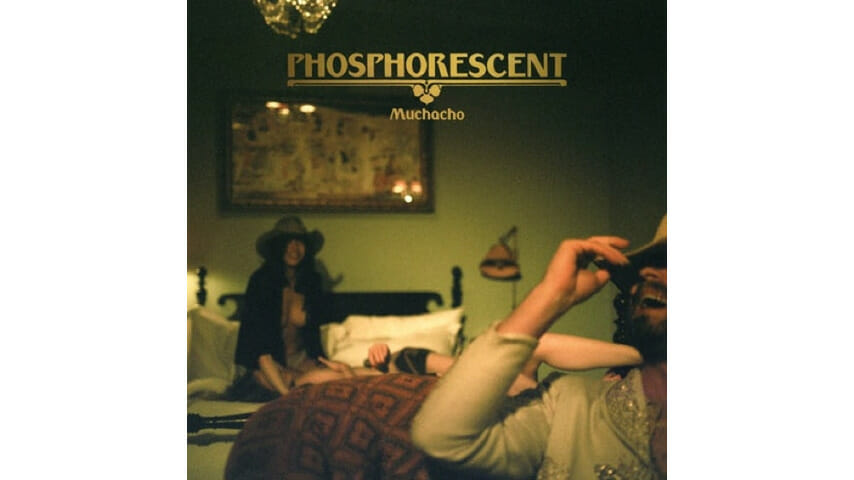Phosphorescent: Muchacho

Sitting down to listen to the latest from Phosphorescent, I armed myself with a blank notepad and a stack of CDs: Richard Buckner and Bonnie Prince Billy, American Music Club’s California and some early Chris Whitley. By the last reverberations of Muchacho’s closing hymn, my scribbled notes were buried beneath books by Malcolm Lowry and Barry Hannah and I’d pulled an entirely different pile of discs off the shelf: Blood On The Tracks, Joshua Tree, Grievous Angel and Robbie Robertson.
Yeah—Muchacho aims that big.
Like the lacerating kiss-offs in Blood On The Tracks, Muchacho’s lyrics map continents of separation and wandering to represent the distance between ex-lovers. Like the panoramic scope of Joshua Tree, the album’s sonic textures capture wonder and immensity while keeping both bootheels on the ground. Like the benders and busts of Grievous Angel, Muchacho pursues both sin and absolution and offers apology for neither. And like Robbie Robertson in his solo debut, Matthew Houck—Phosphorescent’s sole proprietor—adapts contemporary tools and technology to blend troubadour folk, Nashville country and Southern rock into a sound that’s fully his own.
Legend has it that Houck honed the material for Muchacho after a “domestic crisis” forced the Alabama-native to flee New York and seek refuge on the coast of Mexico. Authenticity gadflies may hover over the messes where Houck’s personal autobiography appears to intersect with the songwriting, but more crucially, relative to Phosphorescent’s body of work, Muchacho returns to the desolate peak of his previous album and the site of his most arresting lyrical utterance: “God damn it Amanda, oh, God damn it all.”
The pained dismay of Houck’s phrasing in “The Mermaid Parade” contained an entire backstory of a live-wire love gone horribly south, the emotional consequences so unfathomable the singer can barely articulate the line’s final syllable.
Muchacho recapitulates that moment of love’s collapse and catapults out into the companionable lonesome that waits. The contours of the physical and emotional landscape are set by the monumental “Song For Zula”—windswept by the arid atmospherics of solo Daniel Lanois and solidifying around adamantine strings, the track cycles the storm-gathering grandeur of “With Or Without You” through the defiant heart of Dixie. Stepping into the rhetorical ring with no less formidable a pair than Mister and Missus Cash, Houck works with elements of sand and soil and gold and steam to cast love in some comprehensible form of relief. And damn if he doesn’t succeed—not simply by arranging loaded words in lyric order, but through the spectacular command of his cracked tenor. Once a fragile and ragged acquired-taste, Houck’s voice has shaped into an emphatic and tractile instrument; in “Song For Zula” he sings “I will not open myself up this way again” with a slightly bewildered wince of pain and then—six lines later—repeats the phrase with the subtlest shift in inflection as the revelation has already scarred into resignation.
His heart ricocheting between his mouth and his groin, Houck clenches and moans like one of the raging passionate love-wrecked characters of fellow motorcycle-riding, Southern incorrigible Barry Hannah: men so knotted and charged with ardor they blurt sweet nothings like “I want to rip her arm off. I want to sleep in her uterus with my foot hanging out.” At the close of its six minutes, “Song For Zula” narrows on the primal moment where love becomes something so internally nuclear the only outlet is violent expression:
-

-

-

-

-

-

-

-

-

-

-

-

-

-

-

-

-

-

-

-

-

-

-

-

-

-

-

-

-

-

-

-

-

-

-

-

-

-

-

-








































